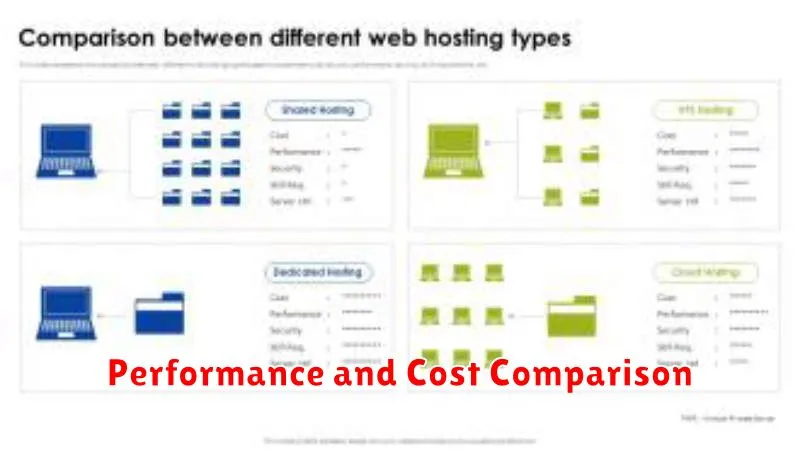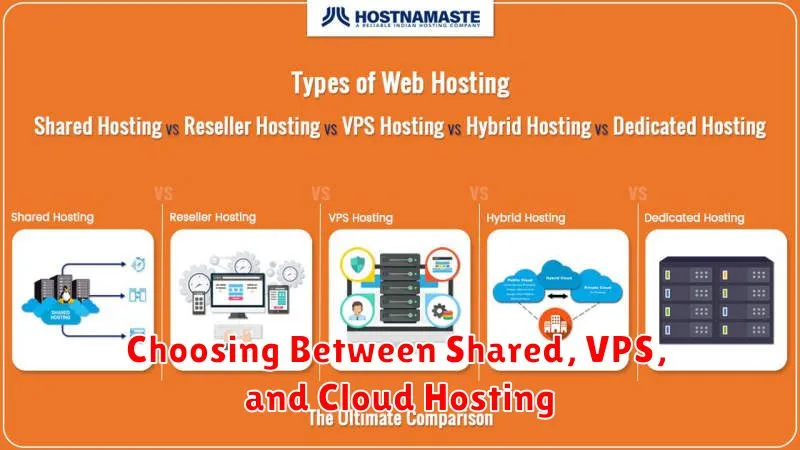Choosing the right web hosting solution can be a daunting task, especially with the multitude of options available. This article aims to simplify the decision-making process by providing a clear comparison of three popular hosting types: shared hosting, VPS hosting (Virtual Private Server), and cloud hosting. Understanding the nuances of each, including their respective advantages and disadvantages, is crucial for selecting the optimal platform for your website’s needs. Whether you’re launching a new blog, running an e-commerce store, or managing a complex web application, choosing the correct hosting environment is paramount for performance, security, and scalability.
This comprehensive guide will delve into the core features of shared, VPS, and cloud hosting solutions. We’ll explore key factors such as performance, security, scalability, cost, and control, providing you with the necessary knowledge to make an informed decision. By understanding the distinct characteristics of each hosting type, you can effectively match your website’s requirements with the most suitable platform, ensuring optimal online presence and long-term success. Whether you prioritize affordability, resource control, or high availability, this comparison will empower you to confidently navigate the world of web hosting and select the perfect solution for your specific needs.
What Is Shared Hosting?
Shared hosting is the most basic and affordable type of web hosting. It’s like renting an apartment in a large building. You share the building’s resources (like electricity, plumbing, and parking) with other tenants. Similarly, with shared hosting, your website resides on a server shared by many other websites. All sites on the server share resources like CPU, RAM, and disk space.
This shared environment makes shared hosting the most cost-effective option, especially for small websites or blogs with limited traffic. The hosting provider manages the server’s technical aspects, including security updates and maintenance, simplifying things for users. However, the shared nature means your website’s performance can be affected by other sites on the same server. If a neighboring site experiences a sudden traffic surge, it could potentially impact your site’s speed.
Shared hosting is generally suitable for beginners, hobbyists, and small businesses with low-traffic websites. It offers a simple, managed, and budget-friendly entry point into the world of web hosting.
What Is VPS Hosting?
VPS hosting, or Virtual Private Server hosting, offers a blend of shared and dedicated hosting. With VPS, a single physical server is divided into multiple virtual servers, each operating independently. This means while you share the physical server’s resources with other users, you have your own dedicated portion, much like a dedicated server.
This setup provides greater control and customization than shared hosting, allowing you to install specific software and configure settings to your needs. It also affords better performance as resources are not directly contended for in the same way as shared hosting. Security is generally enhanced as your virtual environment is isolated from other users on the server.
VPS hosting is a suitable choice for websites experiencing significant growth beyond the capabilities of shared hosting, or for those requiring specific server configurations not permitted in a shared environment.
What Is Cloud Hosting?
Cloud hosting differs significantly from traditional hosting models. Instead of relying on a single server, cloud hosting utilizes a network of interconnected servers, forming a “cloud.” This interconnected nature offers several key advantages.
Scalability is a defining feature. Resources, such as processing power, RAM, and storage, can be easily scaled up or down on demand. This flexibility allows websites to adapt to fluctuating traffic levels, ensuring optimal performance even during peak periods.
Redundancy is another core benefit. With data mirrored across multiple servers, websites become highly resilient. If one server fails, another seamlessly takes over, minimizing downtime. This redundancy also contributes to improved reliability and data security.
Cost-effectiveness can be a significant advantage. Users typically pay only for the resources they consume. This pay-as-you-go model eliminates the need to invest in and maintain expensive hardware, potentially leading to significant cost savings, especially for businesses with variable traffic patterns.
Performance and Cost Comparison

Performance varies significantly across the three hosting types. Shared hosting, being the most resource-constrained, often suffers from the “noisy neighbor” effect where other users on the same server can impact your website’s speed and uptime. VPS hosting offers dedicated resources and greater control, resulting in improved performance and stability. Cloud hosting provides the highest level of performance and scalability, utilizing a network of servers to distribute the load and ensure high availability.
Cost is another crucial factor. Shared hosting is the most budget-friendly option, ideal for small websites with low traffic. VPS hosting offers a balance between cost and performance, making it suitable for growing businesses with moderate traffic. Cloud hosting is typically the most expensive option, but its scalability and reliability make it a worthwhile investment for large websites and applications with high traffic demands.
| Feature | Shared | VPS | Cloud |
|---|---|---|---|
| Performance | Low | Medium | High |
| Cost | Low | Medium | High |
| Scalability | Low | Medium | High |
| Control | Low | Medium | High |
Security and Scalability Considerations
Security and scalability are crucial factors when choosing a hosting solution. Shared hosting often presents security vulnerabilities due to the shared environment. A compromised site on the same server can potentially affect your website.
VPS hosting offers better security through isolated environments. While you share the physical server, your virtual instance is separate, minimizing the risk from other users. Cloud hosting excels in security by distributing resources across multiple servers. This redundancy makes it more resilient to attacks and hardware failures.
Scalability differs significantly between the three options. Shared hosting offers limited scalability. VPS hosting allows for vertical scaling by upgrading resources like RAM and CPU. Cloud hosting provides the greatest scalability, with both vertical and horizontal scaling options. Horizontal scaling allows you to add more server instances as needed to handle traffic spikes, ensuring your site remains responsive.
Use Cases for Each Hosting Type
Shared Hosting is best suited for small websites, blogs, or personal projects with low traffic. It’s an economical choice for beginners and those who require minimal server resources. Think of a small online portfolio or a basic informational website.
VPS Hosting caters to businesses with moderate traffic, requiring more control and customization. It’s ideal for websites with dynamic content, web applications, or e-commerce platforms handling a growing number of visitors. Consider a growing online store or a business website with custom features.
Cloud Hosting is the optimal solution for websites experiencing high traffic fluctuations and requiring maximum scalability and reliability. Large e-commerce platforms, resource-intensive web applications, and businesses demanding high availability benefit most. Imagine a popular online marketplace or a streaming service.
Which Hosting Type Suits You Best?
Selecting the right hosting solution depends on your specific needs and resources. Shared hosting is a cost-effective choice for beginners and small websites with low traffic. Resources are shared among multiple users on a single server. This offers simplicity and affordability but comes with limitations in performance and control.
VPS (Virtual Private Server) hosting provides more control and resources than shared hosting. While still sharing a physical server, your virtual server is isolated, offering dedicated resources and improved performance. VPS hosting suits growing websites with moderate traffic and requires some technical knowledge.
Cloud hosting offers the highest level of scalability and reliability. Your website utilizes resources from a network of servers, ensuring redundancy and adapting to fluctuating traffic demands. This is the most expensive option, suitable for large websites or businesses requiring high availability and performance.
| Feature | Shared | VPS | Cloud |
|---|---|---|---|
| Cost | Low | Medium | High |
| Control | Limited | Moderate | High |
| Scalability | Low | Moderate | High |
| Performance | Low | Medium | High |

